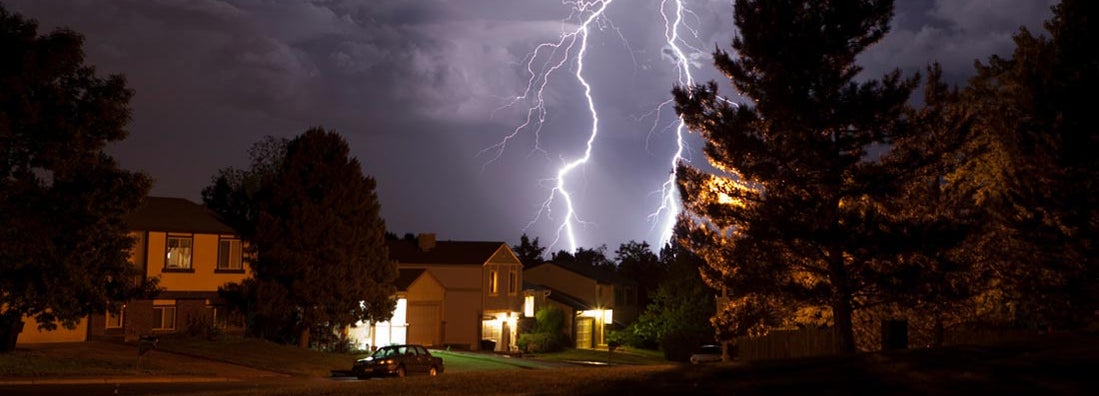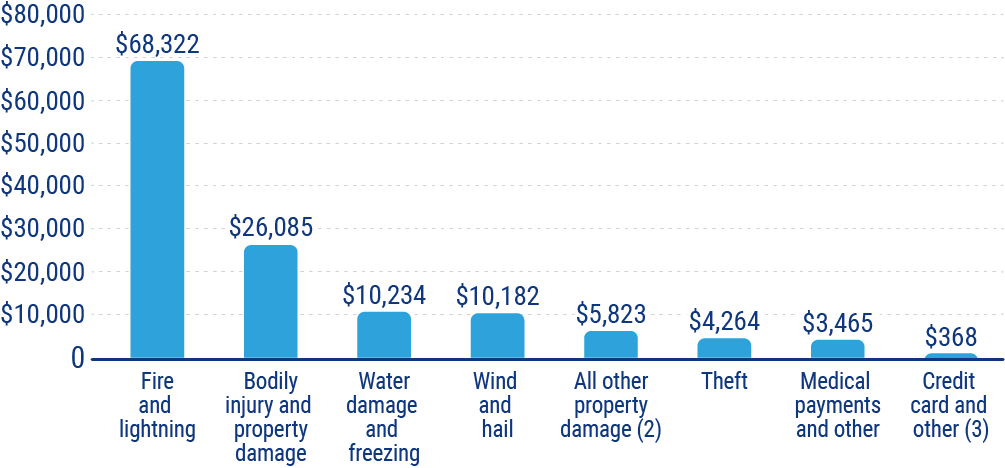Does Home Insurance Cover Lightning Strikes?
(Here's how everything works)

In 2018, 78,000 American homeowners filed claims for lightning damage. When it strikes, the damage can be expensive. Fortunately, your homeowners insurance covers that.
Our network of local independent insurance agents can make sure your coverage is up to date.
You're Covered
The standard homeowners insurance policy covers lightning damage. It also covers damage from falling trees, fire, power surges, and damage to your home, garage, shed, pool cage, and even your trees and shrubs.
Your personal property is covered, too, such as furnishings, appliances, and electronics. If your home has to be rebuilt, your policy will cover some or all of your additional living expenses.
What’s not covered? A standard homeowners policy will only cover the cash value of your belongings. It may not be enough to replace all of your furnishings or appliances. Extra coverage may be available for the replacement value of your personal property. And remember, you’re still responsible for the deductible.
Why Lightning Causes So Much Damage
Because lightning is at such an extreme temperature, it instantly turns moisture to steam. Sap in a tree struck by lightning will heat and expand, blowing the tree apart. Moisture in concrete will expand, damaging the structure. Flammable materials will ignite, causing fire.
Each lightning bolt can contain up to a mind-bending 100 million volts of electricity or more. To put that into perspective, a household outlet carries 110 volts. Lightning current can travel through wiring and pipes, potentially burning them. Lightning traveling through wiring can damage appliances and start fires.
Three Ways to Protect Your Home from Lightning Strikes
1. Install surge protectors
Surge protectors can help sensitive electronics like computers, televisions, cable boxes, etc.
2. Install a lightning protection system
The purpose of these systems is to protect against fire and structural damage. They guide lightning into the ground in the event of a direct strike, but they don't attract lightning and they won't provide surge protection.
3. Take a detailed inventory of your personal property
Take pictures and include whatever documentation you have. Keep the inventory in your safe deposit box.
Protect Your Family and Your Property — Practice Lightning Safety
The first rule is to take lightning seriously. It’s true that getting struck by lightning is rare, but when it happens it can result in severe injury or death. And yes, lightning can and often does strike twice in the same place.
Lightning Safety
| Outdoors |
| If you hear thunder, go indoors or find the nearest shelter. If your car is nearby, get in your car and wait out the storm. |
| If no shelter is available, crouch low with as little of your body touching the ground as possible. |
| Avoid open areas. |
| Stay away from isolated tall trees or utility poles. |
| If you are with a group of people, spread out. |
| Stay away from concrete floors or walls. Lightning can travel through any metal wires or bars in concrete walls or flooring. |
| Indoors |
| Avoid water during a thunderstorm. Don't take a shower or wash your hands. |
| Avoid electronic equipment of all types. |
| Avoid corded phones. Cordless or cellular phones are safe to use during a storm. |
Lightning Happens
Lightning strikes approximately 1 in every 200 homes. While the chances of getting hit by lightning are small, consider this:
- In 2018 there was $900 million of damage caused by lightning
- There were 4000 house fires caused by lightning in 2018
- Fire and lightning are the most severe homeowners loss averaging $68,322
- 240,000 people per year are stuck by lightning worldwide
Homeowner Losses Ranked by Claims Severity (Average Claim) 2013-2017

If Your Home Is Struck By Lightning
Call the fire department and tell them your house was struck by lightning and ask them to check for hot spots. If you see fire or smell smoke, evacuate your house immediately and call 911.
Make a Smart Move and Review Your Coverage
Your homeowners insurance protects you against lightning strikes in many ways. Review your homeowners insurance with one of our local independent insurance agents. They have the experience and expertise to help you make smart choices.
And remember, they’ll be there to help you when claim time comes. They'll help you get the most out of your homeowners insurance.
National Lightning Safety Institute, National Weather Service, Statista, iii.org
